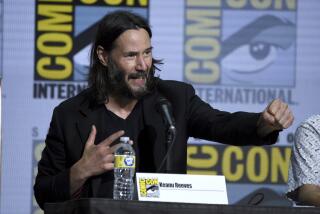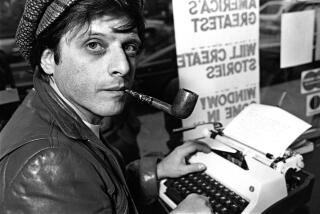When H.G. Wells met Orson Welles, Or: How typos lead to neat things
The strangest part of this story may be that in the middle of World War II, 74-year-old British author H.G. Wells took a train to Texas to speak to a meeting of the United States Brewers Assn. I can’t quite figure out why he was tapped to speak there; perhaps he simply liked beer.
By 1940, Wells had published almost all of his fiction, his fantastical works helped shape science fiction that would come later. Some of his most lasting works, all written before 1900, include “The Time Machine,” “The Island of Doctor Moreau,” “The Invisible Man” and “The War of the Worlds.”
In 1938, “The War of the Worlds” was revised and adapted by a young New York theater director for a radio play: Orson Welles. When it was broadcast, some people didn’t realize it was fiction; they actually thought Martians had landed in New Jersey. The sensation that followed made Welles a star.
San Antonio radio station KTSA brought Welles and Wells together for a conversation that was broadcast on Oct. 28, 1940. “I had a series of delightful experiences since I came to America,” says Wells, “but the best thing that has happened so far is meeting my little namesake here, Orson.” The author then suggests that his American counterpart drop the extra “e” from Welles.
I did the inverse when I tweeted Wednesday about Geoff Nicholson treading in H.G. Wells’ footsteps, as well as Edgar Allen Poe’s, at the L.A. Review of Books. I added an “e” to H.G.’s name where it didn’t belong, then corrected myself about 30 seconds later, noting that I meant the British author, not Orson, the filmmaker.
That’s when Jonathan Shipley, a kind stranger, noted that Wells and Welles once met, pointing me to the audio file of the interview. (Apparently this was also making the rounds in October 2011, but I was, shockingly, away from the Internet that day and missed it.)
It’s pretty amusing that the person who created the YouTube video with the audio file also mixed up Wells and Welles -- he drops the “e,” just as Wells suggested.
The interview took place before the release of Welles’ magnum opus, “Citizen Kane.” Etymologists take note: the reedy-voiced, amused-sounding Wells makes room for Welles to speak promotionally about the movie. Welles says, “This is the kindest and most gracious possible theing to do: Mr. Wells is making it possible for me to do what in America is spoken of as a ‘plug.’” Plugging ensues.
ALSO:
Essential advice for MFA applicants
Seven ill-advised books for your Valentine
Pondering the Pope with ‘Vatican Diaries’ author John Thavis
Carolyn Kellogg: Join me on Twitter, Facebook and Google+
More to Read
Sign up for our Book Club newsletter
Get the latest news, events and more from the Los Angeles Times Book Club, and help us get L.A. reading and talking.
You may occasionally receive promotional content from the Los Angeles Times.








